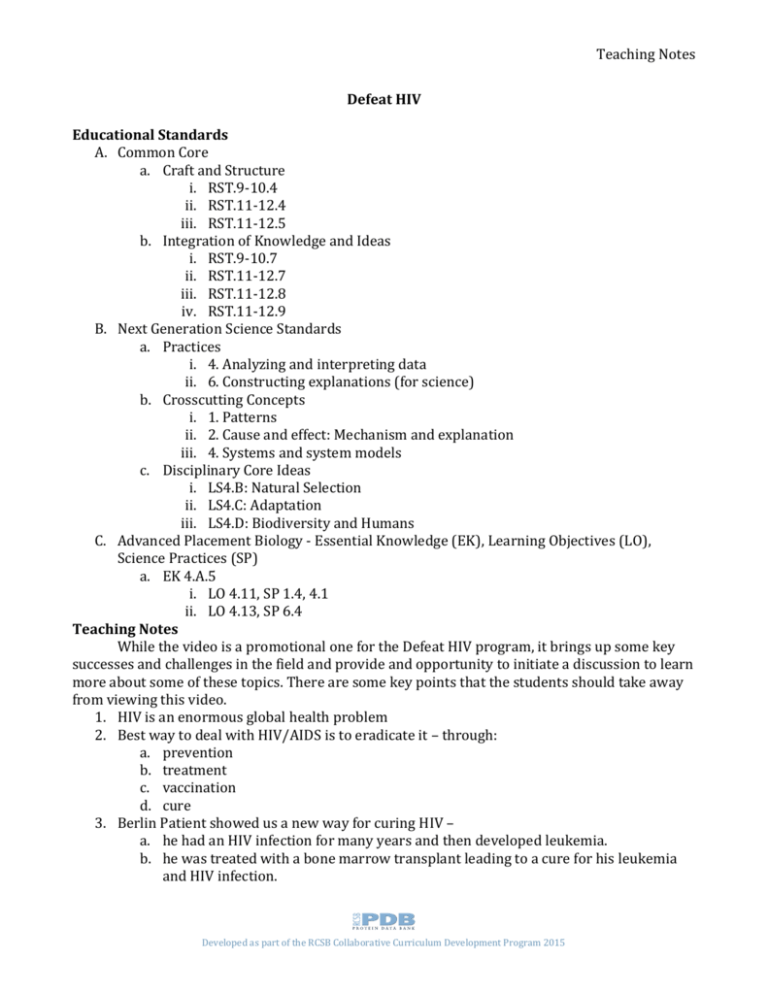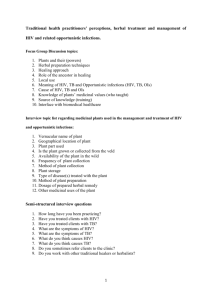Teaching Notes - RCSB Protein Data Bank
advertisement

Teaching Notes Defeat HIV Educational Standards A. Common Core a. Craft and Structure i. RST.9-10.4 ii. RST.11-12.4 iii. RST.11-12.5 b. Integration of Knowledge and Ideas i. RST.9-10.7 ii. RST.11-12.7 iii. RST.11-12.8 iv. RST.11-12.9 B. Next Generation Science Standards a. Practices i. 4. Analyzing and interpreting data ii. 6. Constructing explanations (for science) b. Crosscutting Concepts i. 1. Patterns ii. 2. Cause and effect: Mechanism and explanation iii. 4. Systems and system models c. Disciplinary Core Ideas i. LS4.B: Natural Selection ii. LS4.C: Adaptation iii. LS4.D: Biodiversity and Humans C. Advanced Placement Biology - Essential Knowledge (EK), Learning Objectives (LO), Science Practices (SP) a. EK 4.A.5 i. LO 4.11, SP 1.4, 4.1 ii. LO 4.13, SP 6.4 Teaching Notes While the video is a promotional one for the Defeat HIV program, it brings up some key successes and challenges in the field and provide and opportunity to initiate a discussion to learn more about some of these topics. There are some key points that the students should take away from viewing this video. 1. HIV is an enormous global health problem 2. Best way to deal with HIV/AIDS is to eradicate it – through: a. prevention b. treatment c. vaccination d. cure 3. Berlin Patient showed us a new way for curing HIV – a. he had an HIV infection for many years and then developed leukemia. b. he was treated with a bone marrow transplant leading to a cure for his leukemia and HIV infection. Developed as part of the RCSB Collaborative Curriculum Development Program 2015 Teaching Notes c. cells in the bone marrow transplant were special because they were missing a key protein that is required for HIV entry into host cells. d. with the 4. Learn more about HIV in general and the Berlin Patient specifically using resources listed in the curricular module at RCSB PDB. Developed as part of the RCSB Collaborative Curriculum Development Program 2015 Teaching Notes Key to “Defeat HIV” After viewing the video answer the following questions. Name 2 strategies that are currently being used to manage the spread of HIV/AIDS. (Level: Introductory) 1. prevention through education 2. treatment using combined antiretroviral therapies The video that you watched mentions some challenges in dealing with and defeating HIV. List 2 challenges in defeating HIV? (Hint: Think about some of the current areas of research focus in HIV/AIDS). (Level: Advanced) 1. HIV attacks a key immune system coordinator (CD4+, T helper cells). If untreated this can lead to AIDS. 2. The viral DNA is integrated in the host cells so it is very difficult to fully cure an infected individual What is so special about the Berlin patient and what concept of HIV cure did his case present? (Level: Advanced) 1. Berlin Patient was the first individual cured of HIV. a. After he was treated with a bone marrow transplant leading to a cure for his leukemia his HIV infection was cured too. b. Cells in the bone marrow transplant were special because they were missing a key protein that is required for HIV entry into host cells. 2. This has prompted new areas of research where the specific protein that was missing from the bone marrow cells is now being removed (using genetic engineering) from the T cells of infected individuals to see if that can treat their infection 3. With newly available techniques, efforts are being made to remove the integrated viral DNA from all infected cells to provide a cure for HIV. Developed as part of the RCSB Collaborative Curriculum Development Program 2015



